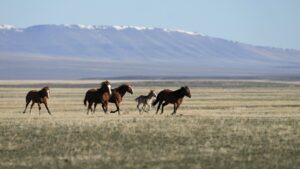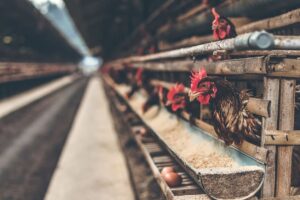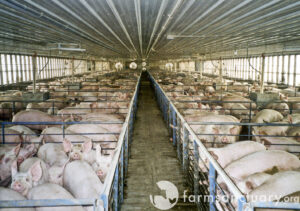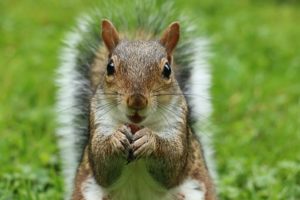Does Animal Personality Research Actually Help Animals?
Not really, but industrial meat companies may start implementing the science behind the trend to suit their own ends. Young cattle by sacratomato_hr via Wikimedia Commons / CC BY-SA 3.0
Young cattle by sacratomato_hr via Wikimedia Commons / CC BY-SA 3.0
It’s clear the vast majority of the world’s agricultural land is devoted to farming animals en masse. According to Our World in Data, a whopping 77 percent of all global farmland is used for pasture, feed crops and factory farms. But it’s not just land. The sheer number of animals slaughtered each year for food is also a staggering one — 165 million in the U.S. alone — a figure so massive that it eclipses the notion of an individual pig or chicken. And yet, scientists are beginning to study just that — the many ways in which farmed animals demonstrate that they are indeed unique individuals, complete with different personality traits and expressions.
Research into the personalities of animals is nascent, but a worrying trend is already beginning to emerge. Rather than use evidence of unique animal personalities to improve welfare, more researchers are studying farmed animal personality to benefit the bottom line of the meat industry — documenting “undesirable” traits to create a blueprint for which animals to cull. Here’s what we know so far about this evolving field.
Anyone with a companion animal would likely say this with absolute certainty: animals have personalities. A cat may be quick to nuzzle or a bit shy, a dog may enjoy rambunctious exercise or quiet napping and a chicken can in fact be playful.
Research into unique animal personalities is still in its early days, but more and more studies are beginning to emerge. In 2000, only a handful existed but today, there are nearly 1000 studies sprinkled across scientific publications.
When it comes to farmed animals, so many of the variables are the same — on a single farm, animals usually lead identical lives.
One reason the field lagged is the lack of available research methods. Normal psychological measures used on humans — like surveys or behavioral assessments from friends or family — are obviously off the table. Animal researchers instead rely on assessments from caretakers, as well as behavioral observations. The first is more subjective — an animal keeper may rate a certain cow’s desire to explore from 1 to 10 — while the latter is more objective — for example, giving a herd of cows ten minutes to roam a new field in order to measure how far they explored.
Researchers now define an animal personality as any behavioral difference between two animals that is consistent across time and situation. A squirrel that is prone to gobbling up chestnuts as soon as she sees them will have a more eager personality while her more patient companion may be more careful to build up reserves instead.
Even with this definition, research is limited. Investigations nearly always involve the presence of humans, who can invoke a natural fear response in animals that automatically changes their behavior and personality. This raises the question — do animals possess other personality traits when humans aren’t around? Unfortunately, this has proven very difficult to answer.
Michael Webster and Christian Rutz, both animal scientists, developed an acronym to wrestle with the thorny question of animal personalities: STRANGE (Social background, Trappability, Rearing history, Acclimation and habituation, Natural changes in responsiveness, Genetic makeup, and Experience). While the traits don’t exactly roll off the tongue, the list helps set parameters for this evolving field.
Some critics say the research is inherently flawed because scientists are mapping human personality traits onto non-human animals, especially those non-human animals who are evolutionarily or biologically distinct from humans. What does extraversion look like in an octopus, with their eight neural nodes in each tentacle in addition to a central brain? How does neuroticism present in a songbird, whose brains are far denser than humans’ and lack our walnut-like folds?
What’s more — researching farmed animals presents a related dilemma — a chicken raised in captivity under unpleasant or cramped conditions is not going to have the same personality as if he or she were raised in a natural environment. So then, what aspects of their unique personalities might be lost or suppressed? At this point, researchers have more questions than answers.
When it comes to farmed animals, so many of the variables are the same — on a single farm, animals usually lead identical lives.
Cows tend to have stable personality traits throughout their existence, with the exception of during puberty. They’re remarkably social animals, capable of remembering the faces of many species and even having best friends. They also like to play. Within a herd however, cows do differ greatly in their boldness, or willingness to explore. Some cows love diving into new fields while others hang back and prefer to keep to themselves.
There are some farmers and scientists who’d like to avoid the question of individual animal personality altogether by breeding it out.
Pigs are naturally curious, bright and self-aware. Aggressiveness, boldness and socialness are some of the most studied traits in farmed pig populations, and pigs often vary greatly on personality scales. Some pigs are highly social, preferring small, tightly-knit groups, while some have even been shown to help solve inter-pig conflicts.
As the field of animal personality has grown, especially in industry journals, a worrying pattern is emerging — studies are increasingly aimed at boosting farm productivity rather than animal welfare.
Dairy cows are a common research subject, for instance. A recent study from the Journal of Dairy Science has shown that bold cows who enjoy exploring adapt better to automatic milking machines and nervous cows tend to produce less milk. Another study in the same journal found that alert and curious cows are more likely to eat more in milking stations.
Cows raised for beef are also a frequent subject. Those with faster flight speed — their response time once released from confinement — are shown to gain weight slower than calmer cows, while cows that were relaxed at weigh-in were more likely to have higher than average weight gains.
The science of identifying personality traits empirically in a herd of animals is time-intensive, requiring multiple behavior assessments and even complex equipment. There are some farmers and scientists who’d like to avoid the question of individual animal personality altogether by breeding it out.
When the industry assesses animal personality traits, researchers are often looking to make decisions about which animals to “cull” — an industry euphemism for killing undesirable animals. For example, fearful or skittish cows who don’t react well to milking equipment are often killed because they will impede efficiency on dairy farms.
Some scientists have experimented with using genetic selection to weed out certain undesirable personality traits. Excessively fearful or extroverted dairy cows are rated on a scale from 1-9 for instance, with the cows displaying extreme scores killed off in order to increase farmers’ profits.
One study found that farms can breed animals who tend to overeat in order to grow at a faster rate — a trait profitable for farmers. Another suggests that breeding animals without certain personality traits, most notably fearfulness, can create vast herds of animals with emotions ideal for factory farm life, and of course, death.
The bottom line — much of this research is still theoretical and it does have the potential to deepen our understanding of animals.
If personality-informed breeding were to become widely adopted by the industry, we might see a repeat of what happened when farmers in the late 20th century bred animals to be bigger and fatter to boost profits. The move made the industry highly efficient and profitable, but it also created a slew of animal welfare problems that persist to this day. While the science is still relatively new, and very few farms explicitly use these breeding methods, the tilt of this research suggests the strong possibility of an uptick in farms breeding animal personalities to suit their bottom line — and with that presumably a whole new set of unintended consequences for animal well-being.
Some research into animal personality does have the potential to benefit welfare. Farmers who manage pastoral herds can train bolder animals to find new grazing areas, for instance, which may lead shy individuals into enjoying more diverse plants for eating. When animals move through stages of life, like from weaning to adolescence, farmers can pay special attention to the less social animals to ensure they develop social skills. Allowing piglets of different litters to play together early in life can lead to less in-fighting as they age on a farm.
But a number of producers have used research to promote the welfare conditions of their own farms, claiming they ensure the so-called “natural behavior” of their animals. Because “natural behavior” is not rigorously defined, most farms don’t actually engage in improving well-being based on any verifiable understanding of animal personality. In other words, these claims tend to be little more than humane-washing.
The bottom line — much of this research is still theoretical and it does have the potential to deepen our understanding of animals. But the recent uptick of studies into farmed animal personality warns it may only be a matter of time before industrial meat companies start implementing the science behind the trend to suit their own ends. It’s yet another reason why stronger regulation of meat companies is so desperately needed.
Your support matters…Independent journalism is under threat and overshadowed by heavily funded mainstream media.
You can help level the playing field. Become a member.
Your tax-deductible contribution keeps us digging beneath the headlines to give you thought-provoking, investigative reporting and analysis that unearths what's really happening- without compromise.
Give today to support our courageous, independent journalists.








I bet Freud and Jung, Sapiens thinkers, didn't not notice and if they did, did not care, just as I normally don't when having a glass of milk or eating meat, whether marine or terrestrial; I am Sapiens.